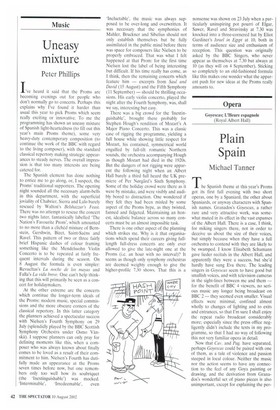Music
Uneasy mixture
Peter Phillips
I've heard it said that the Proms are becoming evenings out for people who don't normally go to concerts. Perhaps this explains why I've found it harder than usual this year to pick Proms which seem really exciting or innovative. To me the programming has shown an uneasy mixture of Spanish light-heartedness (to fill out this year's main Proms theme), some very heavy-duty contemporary composition (to continue the work of the BBC with regard to the living composer), with the standard classical repertory making strategic appearances to steady nerves. The overall impression is that too many interests are being catered for.
The Spanish element has done nothing to entice me to go along, or, I suspect, the Proms' traditional supporters. The opening night sounded all the necessary alarm-bells in this department, with the superficial joviality of Chabrier, Sierra and Lab o barely rescued by Walton's Belshazzar's Feast. There was no attempt to rescue the concert two nights later, fantastically labelled 'The Nation's Favourite Prom', which amounted to no more than a cliched mixture of Bernstein, Gershwin, Bizet, Saint-Saens and Ravel. This pattern of two or three fairly brief Hispanic dashes of colour framing something like the Mendelssohn Violin Concerto is to be repeated at fairly frequent intervals during the season. On 8 August the formula is even simpler: Revueltas's La noche de los maps and Falla's La vida breve. One can't help thinking that this will primarily be seen as a concert for holidaymakers.
At the other extreme are the concerts which continue the longer-term ideals of the Proms: modern music, special commissions and the more obscure corners of the classical repertory. In this latter category the planners achieved a spectacular success with Nielsen's Fourth Symphony on 29 July (splendidly played by the BBC Scottish Symphony Orchestra under Osmo Vanska). I suppose planners can only pray for defining moments like this, when a composer who was always known about finally comes to be loved as a result of their commitment to him. Nielsen's Fourth has dutifully made an appearance at the Proms seven times before now, but one remembers only too well how its soubriquet (the 'Inextinguishable') was mocked.
'Interminable', 'Irredeemable', even
'Ineluctable', the music was always supposed to be over-long and overwritten. It was necessary that the symphonies of Mahler, Bruckner and Sibelius should not only establish themselves but be fully assimilated in the public mind before there was space for composers like Nielsen to be properly embraced. That was what I felt happened at that Prom: for the first time Nielsen lost the label of being interesting but difficult. If his time really has come, as I think, then the remaining concerts which feature him — excerpts from Saul and David (15 August) and the Fifth Symphony (11 September) — should be thrilling occasions. His early violin concerto, played the night after the Fourth Symphony, was, shall we say, interesting but easy.
There was a big crowd for the 'Inextinguishable', brought there probably for Stephen Hough's rendition of Mozart's A Major Piano Concerto. This was a classic case of rigging the programme, yielding a full house while showing little respect for Mozart, his contained, symmetrical world engulfed by full-tilt romantic Northern sounds, the orchestra accompanying Hough as though Mozart had died in the 1920s. But the dangers of not rigging were apparent the following night when an Albert Hall barely a third full heard the UK premiere of Per NOrgArd's Sixth Symphony. Some of the holiday crowd were there as it were by mistake, and were visibly and audibly bored to distraction. One wondered if they felt they had been misled by some aspect of the Proms hype, as they twisted, fanned and fidgeted. Maintaining an honest, idealistic balance across so many concerts must be an almost impossible task.
There is one other aspect of the planning which strikes me. Why is it that organisations which spend their careers giving fulllength full-dress concerts are only ever allowed to give the late-night one at the Proms (i.e. an hour with no interval)? It seems as though only symphony orchestras are deemed weighty enough to give the higher-profile 7.30 shows. That this is a
nonsense was shown on 23 July when a particularly uninspiring pot pourri of Elgar, Sawer, Ravel and Stravinsky at 7.30 was knocked into a three-cornered hat by Eliot Gardiner's Israel in Egypt at 10, both in terms of audience size and enthusiasm of reception. This question was originally asked by the BBC Singers, who never appear as themselves at 7.30 but always at 10 (as they will on 4 September). Sticking so completely to an old-fashioned formula like this makes one wonder what the apparent push for new ideas at the Proms really amounts to.


























































 Previous page
Previous page